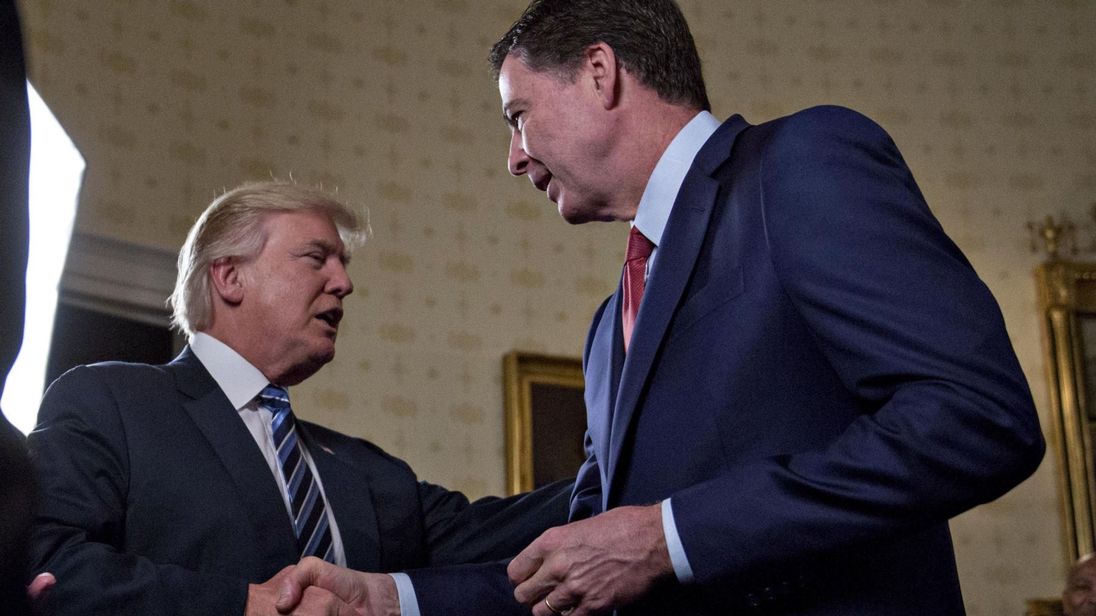The former director of the FBI James Comey has been making a number of public appearances ahead of the release of his new book A Higher Loyalty: Truth, Lies and Leadership. Comey is arguably best known for the interactions he had with Donald Trump, who went on to fire him, in the context of the investigation into Russian involvement in Trump’s presidential campaign. As a result, part of the aim of Comey’s book and the media appearances surrounding it, is to attempt to lift the lid on the actions of the president.
Indeed, Comey’s descriptions of Trump have been strongly worded to say the least. In an interview with ABC he compared Trump to a “forest fire”, capable of causing serious and long-lasting damage, and suggested he would have the most negative effect on American politics since the Watergate scandal.
He also noted the apparent similarities between Trump’s leadership style and those of the high-ranking mobsters whom Comey dealt with during his career in law enforcement. In particular, he emphasised the importance of serving ‘the boss’ in the White House, explaining that those who worked with Trump were expected to express their loyalty to him and act in his best interests, regardless of whether it would benefit the country as a whole. Comey went on to claim that as allegations of collusion with Russia emerged, he himself was asked to pledge his loyalty to Trump at a private dinner between the two men. By Comey’s account, his refusal to commit such loyalty stood him in poor stead with Trump, and may have resulted in his firing a month later.
 Comey shakes hands with Trump before being removed as head of the FBI (Source: Sky News)
Comey shakes hands with Trump before being removed as head of the FBI (Source: Sky News)
Yet Comey’s revelations have been met with a decidedly mixed reaction. They have been welcomed in some quarters as an example of the kind of transparency needed to properly hold leaders like Trump to account, particularly in the context of claims as explosive as the ones facing the president. Releasing information to the public about Trump’s behaviour surrounding the Russia investigation can be seen as a way of letting the country as a whole, rather than merely groups of bureaucrats and lawyers working behind the scenes, judge the actions of the man who is supposed to represent them.
On a cruder basis as well, many are simply pleased to see further negative stories coming to light about a president they strongly dislike, in the hope that some of the bad press begins to stick. Surely, some will think, there are only so many treasonous tales that can be told about one man before the patriotic Right turns on him.
My book is about ethical leadership & draws on stories from my life & lessons I learned from others. 3 presidents are in my book: 2 help illustrate the values at the heart of ethical leadership; 1 serves as a counterpoint. I hope folks read the whole thing and find it useful.
— James Comey (@Comey) April 15, 2018
At the same time, though, others have expressed disappointment in Comey for compromising his position of having been privy to a great deal of important information. Many of his former employees have complained that disclosing such information around an ongoing investigation, particularly in such a sensationalist manner, may undermine the status of the FBI as a serious and vital institution. Ron Hosko, a former assistant director of the criminal division of the bureau, outlined concerns that “by talking like this Comey is not helping the FBI’s ability to fight back against the attacks on its reputation that have been coming from Trump”.
Many of Comey’s descriptions of Trump also appear to be playing to an audience desperate for any excuse to mock and deride the president. In some of Comey’s accounts of interactions between the two, he focuses on details such as the size of the president’s hands or the appearance of his hairstyle, themes which do not fit with what should be overall a sober discussion of the potential misconduct of a political leader. A cynic may argue that excerpts such as these, and perhaps the book as a whole, were put together with the aim of making money from a strongly anti-Trump readership rather than as a necessary exposé.
Comey’s revelations raise interesting questions in a divided America: should you compromise your integrity in order to attack those who you believe have compromised theirs? Can you go too far in attempting to hamper a leader you think dangerous, and should you profit from doing so? As interesting as all these questions are, they are perhaps not the ones Comey expected to provoke when speaking out about his president.


